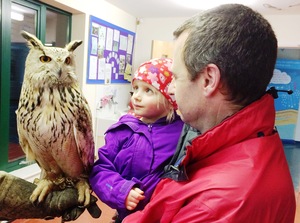
Meeting Boris, an Eagle Owl
Published on 2015-01-05 by Gill Hickman
I hope that some schools will take part in RSPB Birdwatch during January and I can offer both inspiration and help. Read on!
Meet Boris, an Eagle Owl who was bred in captivity at Ringwood. I met Boris at Hampshire Wildlife Trust’s beautiful Education Centre at Testwood Lakes. I was first struck by his size: the Eagle Owl is one of the largest species of owl. Boris’ upper parts were mottled black and tawny and the wings and tail were barred. The underparts were buff, streaked with darker colour. His facial disc that allows owls to funnel sounds into their ears, was not as well developed as in some owls such as the Barn Owl. His orange eyes were an attractive and highly distinctive feature.
Eagle Owls have distinctive ear tufts, and Boris’ owner, Paul Miller, gave a few suggestions about why some owls have these tufts. What is clear is that owls like Boris are usually nocturnal and have evolved to use their hearing to locate their prey. Paul explained that Boris’ ears are located behind their eyes and are offset. Therefore sounds reach the ears at slightly different times and they can pinpoint prey. Great biology!
Boris remained silent and immobile, uncannily so whilst I, and a number of other visitors admired him. Boris’ visual field is approximately the same as ours but Paul informed me that extra vertebrae give him a very flexible neck to turn the head well over180o to see behind. And once relaxed, that is exactly what Boris did; remaining on his perch, he turned his head to look out of the window. It was clear that this was a bird that could swoop down swiftly once prey has been spotted. I noticed Boris’ powerful talons and considered that these would ensure the quick death of his prey- usually small mammals
Paul also has another rare raptor – a hen harrier that ironically eagle owls are known to attack because they share the same territory. They could be viewed as a danger to the highly endangered hen harrier. The RSPB however rightly says that a much greater danger to hen harriers and other birds of prey are gamekeepers who illegally shoot and poison them. Both Boris and Paul’s hen harrier are visit schools that are part of the ‘Sussed in the Forest’ group. This is a great opportunity for children to get up close to birds of prey and may inspire some to develop an interest in birdwatching. Paul is also available to help children with RSPB Birdwatch. A great offer! If you’d like to do this, do get in touch.
